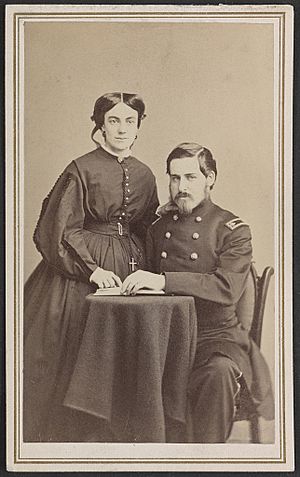Charles F. Walcott facts for kids
Quick facts for kids
George F.Walcott
|
|
|---|---|

Lt Colonel Charles Folsom Walcott and wife Anna Morrill Wyman Walcott (late 1864)
|
|
| Birth name | George Folsom Walcott |
| Born | December 22, 1836 Hopkinton, Massachusetts, U.S. |
| Died | June 11, 1888 (aged 51) Salem, Massachusetts, U.S. |
| Buried |
Mount Auburn Cemetery
|
| Allegiance | |
| Service/ |
Union Army |
| Rank | Brigadier General |
| Commands held | 21st Regiment Massachusetts Volunteer Infantry 12th Regiment of Massachusetts Militia 61st Regiment Massachusetts Volunteer Infantry |
| Battles/wars | American Civil War |
| Alma mater | Harvard Law School |
George Folsom Walcott was an officer in the Union Army during the American Civil War. The Union Army was the army of the Northern states during this big conflict in American history.
Contents
Early Life and Education
George F. Walcott was born on December 22, 1836. His hometown was Hopkinton, Massachusetts. He went to Harvard University and graduated in 1857. Later, he studied law at Harvard University Law School, finishing in 1860. After his studies, he became a lawyer.
Serving in the Civil War
George Walcott played an important role in the American Civil War. He joined the Union Army and quickly rose through the ranks.
Rising Through the Ranks
On August 5, 1861, Walcott became a captain in the 21st Regiment Massachusetts Volunteer Infantry. He served in this role until April 25, 1863. He later became captain of the 12th Regiment of Massachusetts Militia in May 1864.
In September 1864, he was appointed lieutenant colonel of the 61st Regiment Massachusetts Volunteer Infantry. By February 1865, he became a colonel of the same regiment. He left volunteer service on June 4, 1865, as the war was ending.
Becoming a General
For his brave and excellent service during the war, George Walcott received a special honor. On January 13, 1866, President Andrew Johnson nominated him for the rank of brevet brigadier general. A "brevet" rank is an honorary promotion given for outstanding service. It means he was recognized as a general, even if he didn't always have the full command or pay of that rank.
This honor was given because his actions helped lead to the fall of Richmond, Virginia. Richmond was the capital of the Confederate States. His service also helped with the surrender of the Army of Northern Virginia. This was a major step towards ending the Civil War. The United States Senate confirmed his promotion on March 12, 1866.
After the War
After the war, George F. Walcott wrote a book. It was called History of the Twenty-First Regiment, Massachusetts Volunteers, in the War for the Preservation of the Union, 1861-1865. This book shared the story of his regiment's experiences during the war.
George F. Walcott passed away on June 11, 1881, in Salem, Massachusetts. He was buried at Mount Auburn Cemetery in Cambridge, Massachusetts.
 | Laphonza Butler |
 | Daisy Bates |
 | Elizabeth Piper Ensley |

